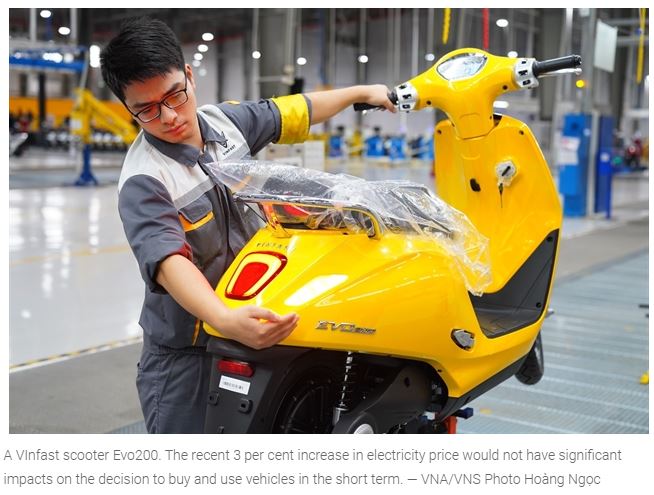Vietnam: Electricity price increases to affect electric vehicle market
The increase may not have an immediate impact on prices of electric vehicles at the moment but will create an impetus for manufacturers to use energy more economically.
HÀ NỘI — The recent 3 per cent increase in electricity prices would not have significant impacts on the decision to buy and use electric vehicles in the short term but it would be a different matter in the long term.
This requires Việt Nam to implement policies to encourage the development of battery-powered vehicles.
Electric vehicle manufacturer VinFast said that the charging fee remained unchanged VNĐ3,117.4 per kWh although the electricity price was hiked by 3 per cent starting from the beginning of this month.
According to Đàm Hoàng Phúc, director of the automobile technical training programme of Hà Nội University of Technology, the recent increase in electricity prices would not have much influence on the decision to buy and use electric vehicles because electricity prices were less volatile compared to gasoline and oil prices.
“The increase may not have an immediate impact on prices of electric vehicles at the moment but will create an impetus for manufacturers to use energy more economically,” Phúc said. In fact, electricity prices in Việt Nam were cheaper than in many countries in the region and the world, thus, enterprises had not paid adequate attention to using energy efficiently.
Still, in the long term, the upward trend of electricity prices would affect the development of electric vehicles, especially when the market was just at an early stage.
Việt Nam’s automobile industry development strategy to 2025 with a vision to 2035 dated July 16, 2014, encouraged the production of environmentally friendly vehicles, including fuel-saving, hybrid, biofuel-powered, and battery-powered, meeting the emission standards. Another point of the strategy was developing the automobile industry in sync with the development of transport infrastructure.
However, not until diversified group Vingroup participated in automobile manufacturing with VinFast, did the electric vehicle sector see development.
Statistics from Việt Nam Register showed that the number of electric vehicles in Việt Nam increased from 140 in 2019 to 900 in 2020 and 1,000 in 2021.
According to the Việt Nam Chamber of Commerce and Industry (VCCI), Việt Nam encouraged the use of electronic vehicles to reduce air pollution in urban areas. However, vehicle owners have to pay relatively high charging fees.
VCCI pointed out that the electricity prices vehicle owners had to pay when charging at home were about VNĐ3,100-3,200 per kWh. Charging at service points was at more than VNĐ3,100 per kWh.
In some developed countries, power companies started to offer price packages for charging electric cars. VCCI said that packages of lower electricity prices for charging electric cars should be put into consideration to encourage the development and use of electric vehicles. There should be different levels of electricity prices depending on the time to encourage charging during offpeak hours.
VCCI proposed to apply a two-part tariff in electricity for charging to prevent customers from requesting a line for charging but not using it.
Việt Nam currently applied a preferential registration fee for battery-powered cars of zero per cent for three years from March 1, 2022 and a reduction of 50 per cent compared to fossil fuel-powered cars of the same number of seats in the next 2 years.
The special consumption tax rate for battery-powered cars was also reduced to 1-3 per cent, effective until February 2017, which was considered necessary for the development of electric vehicles.
The electric vehicle market in Việt Nam is becoming more exciting recently with the introduction of many models such as VFe34, VF 8, VF 5 Plus of Vinfast, IONIQ5 of TC Group, EQS of Mercedes – Benz and EV6 of Kia. — VNS


 English
English




